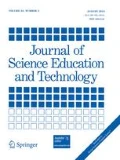Abstract
This paper presents the results of a study designed to examine the effects of distance delivery on student performance and classroom interactions in an upper level science (Histology) course. Outcomes were assessed by comparing performance on content pre- and posttests for students enrolled in on-campus and on-line sections of the same course. Interactions were classified according to initiator, topic, and Bloom's taxonomy level for content interactions. The resulting patterns were analyzed to compare behaviors in different settings. It was found that although the groups were indistinguishable in content knowledge at the outset of the study, by the end of the semester, students in the on-line group significantly out-performed their peers in the on-campus section. The on-line settings had a greater proportion of high-level interactions (according to Bloom's taxonomy) than the on-campus setting.
Similar content being viewed by others
REFERENCES
Bloom, B. S., and Krathwohl, D. R. (1956). Taxonomy of Educational Objectives: The Classification of Educational Goals, by a Committee of College and University Examiners. Handbook I: Cognitive Domain, Longmans, New York.
Carr, S. (2000, March 10). Science instructors debate the efficacy of conducting lab courses online. The Chronicle of Higher Education [On-line]. Available at: http://chronicle.com/free/2000/03/2000031001u.htm/ (June, 2000).
Clark, R. E. (1983). Reconsidering research on learning from media. Review of Educational Research 53: 445–459.
Clark, R. E. (1994a). Media will never influence learning. Educational Technology, Research and Development 42(2): 21–29.
Clark, R. E. (1994b). Media and method. Educational Technology, Research and Development 42(3): 7–10.
Cohen, J. (1988). Statistical Power and Analysis for the Behavioral Sciences (2nd ed.), Erlbaum, Hillsdale, NJ.
International Data Corporation (2000). Distance Learning Takes Off, Fueled by Growth in Internet Access [On-line]. Available at: http://www.idc.com/Data/Consumer/content/CSB020999PR.htm (July, 2000).
Kimbrough, D. R., Hochgurtel, B.D., and Smith, S. S. (1998). Using internet relay chat to provide on-line tutorials in a distancelearning chemistry course. Journal of College Science Teaching 27: 132–136.
Kozma, R. B. (1991). Learning with media. Review of Educational Research 61(2): 179–211.
Kozma, R. B. (1994a). Will media influence learning? Reframing the debate. Educational Technology, Research and Development 42(2): 7–19.
Kozma, R. B. (1994b). A reply: Media and methods. Educational Technology, Research and Development 42(3): 11–14.
Kulik, J. A., Kulik, C.L.C., and Cohen, P. A. (1980). Effectiveness of computer-based college teaching: A meta-analysis of findings. Review of Educational Research 50: 525–544.
Moore, M. G., and Kearsley, G. (1996). Distance Education: A Systems View, Wadsworth, Belmont, CA.
O'Bannon, D., Scott, J., Gunderson, M. S., and Noble, J. (2000). Integrating laboratories into online distance education courses. Technology Source [On-line]. Available at: http://horizon.unc.edu/ts/cases/2000-01a.asp (February, 2000).
Russell, T. L. (1999). The no significant difference phenomenon [On-line]. Available at: http://cuda.teleeducation.nb.ca/nosignificantdifference/ (July, 2000).
Slavin, R. (1996). Research on cooperative learning and achievement. Contemporary Educational Psychology 21: 43–69.
Vygotsky, L. (1978). Mind in Society: The Development of Higher Mental Processes, Harvard University Press, Cambridge, MA.
Author information
Authors and Affiliations
Rights and permissions
About this article
Cite this article
Schoenfeld-Tacher, R., McConnell, S. & Graham, M. Do No Harm—A Comparison of the Effects of On-Line vs. Traditional Delivery Media on a Science Course. Journal of Science Education and Technology 10, 257–265 (2001). https://doi.org/10.1023/A:1016690600795
Issue Date:
DOI: https://doi.org/10.1023/A:1016690600795




